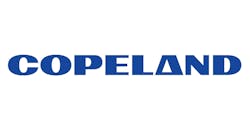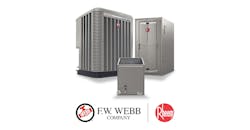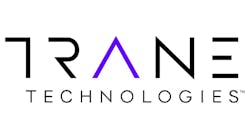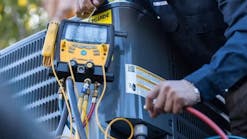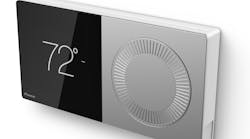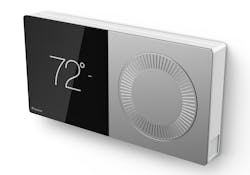Daikin North America LLC today at the Consumer Electronics Show introduced The Daikin One+™ smart thermostat, an architecturally-inspired intelligent home air management controller. Beyond a typical smart thermostat, it is a controller for a full professional HVAC system with a growing ecosystem of air quality modules to give consumers more control over the air they breathe and a premium HVAC experience.
Sources say with the introduction of the Daikin One+™ ecosystem, Daikin, the world's largest heating and air conditioning manufacturer, is up-ending the status quo in the HVAC market, where players have been conservative in adopting IoT technologies and, until recently, relegated leadership in the smart thermostat category to consumer electronics brands.
The Daikin One+ smart thermostat is the first smart thermostat to offer full two-way communications and serves as a cloud-connected hub and controller for sophisticated, communicating HVAC systems. In combination with Daikin’s smart inverter HVAC systems, such as the Daikin FITTM system, the Daikin One ecosystem of indoor air quality modules provides an unparalleled, integrated solution for temperature control and air quality. It allows people to “Visualize the Air™” inside their home and reacts on cues to provide a premium indoor air environment. That’s “Air Intelligence™.”
Sources say the Daikin One+ smart thermostat is different from other smart thermostats in four ways:
1. It’s not just a switch to turn the HVAC system on and off. Other smart thermostats from consumer electronics companies lack the protocols to communicate with HVAC equipment. And, while some other HVAC manufacturers offer custom controllers, they lack sophisticated user interface and physical design.
2. In combination with the Daikin One ecosystem, it offers indoor air quality modules, including the Daikin One air cleaner, Daikin One home air monitor and Daikin One zone monitor that all work together seamlessly. For example, homeowners are notified when a contaminant event occurs and have the option to run the HVAC system to help reduce contaminants.
3. Because of its intelligence, the Daikin One+ smart thermostat enables users to set different temperatures in different zones of a home, keeping residents comfortable wherever they are in the home.
4. The thermostat interface lets a user decide how to control a home’s temperature in two different ways: digital and analog. Daikin offers both technologies for simple and sophisticated control, in one elegantly designed thermostat.
Re-imagining the thermostat:
Applying world-class design for extraordinary simplicity and premium experience
The Daikin One+ smart thermostat was beautifully crafted and designed in collaboration with one of the consumer electronics industry’s and Silicon Valley’s leading industrial product designers, Fred Bould of Bould Design. Bould, the designer of many iconic consumer devices, worked in cooperation with Dubberly Design Office to develop a state-of-the-art user interface with Daikin engineers in Houston.
The thermostat design features a double square structure that pairs a sophisticated high-resolution digital color touch screen on the left side with the proven functionality of a classic analog dial control on the right side. This arrangement reflects well-established patterns of cognitive interaction (reading from left to right). For fast, on-the-go temperature adjustments, the dial is the perfect tool. For more involved control, such as setting a schedule, a refined capacitive touch interface offers an easy-to-understand menu system. A simple touch on the display reveals access to the full range of settings.
New and casual users see the current temperature, turn the dial, and see the set points. But just taps away are other key features — scheduled set-point changes, energy-saving “away” set-points and air quality readings. Users can also opt for user-friendly mobile applications and voice control via leading voice assistance platforms. Professional contractors can go even deeper into operations, but these settings are kept well out of the way of casual users.
Reinforcing the touch interface experience is a thin light strip that projects an orange or blue glow underneath the thermostat to indicate the current system mode: orange for heating, blue for cooling. A proximity sensor wakes the thermostat on approach to be ready for input.
Daikin took the same level of care with design and development of the user interface, companion mobile app and contractor installation app.
“Daikin’s philosophy is one of simplicity. Fitness-for-purpose. Craftsmanship. Thoroughness. A feeling of calm,” said Dennis Thoren, VP of technology strategy for Daikin. “We explicitly designed the Daikin One+ smart thermostat for three different audiences: casual users who simply want to change the temperature; homeowners who are concerned about maximizing efficiency and customizing settings to their needs, and finally, it had to work for our professional contractors, the folks installing the system, who have sophisticated technical needs.”
Inside the Daikin One+ smart thermostat
An integrated Wi-Fi radio connects to the homeowner app through the internet, while a sub-GHz radio gathers data from remote sensors and talks to other thermostats in the home to support independent zone control. Dual processors allow the thermostat to connect with other thermostats and the companion app, gather data from remote sensors and maintain two-way communication with the HVAC equipment to control the whole system. Geo-fencing automatically reduces energy use and saves money when no one is home, and the device supports utility demand-response programs to further reduce energy expenses.
The Daikin One cloud also seamlessly integrates with open smart home architectures including Amazon Alexa and Google Assistant. It has an open application programming interface (API) for other home automation platforms, allowing consumers to effortlessly use features such as voice control. Further, Daikin’s One cloud will allow utilities to reduce power demand simply and effectively using OpenADR 2.0 protocol that allows consumers to benefit through lower electricity bills.
For additional information, visit northamerica-daikin.com



